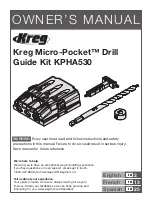
5
DEFINITIONS O F JOINTING A N D PLANING O P E R ATIONS
Fig. 2
Fig. 3
JOINTING O P E R ATIONS Jointing cuts or edge jointing is the simplest and most common operation which can be
done on the jointer and these cuts are made to square an edge of a workpiece. The fence is square with the table and
the depth of cut is approximately 1/8 inch. The workpiece is positioned on the jointer with the narrow edge of the work-
piece on the infeed table and the major flat surface of the workpiece against the fence, as shown in Fig. 2. The work-
piece is moved from the infeed table, across the cutterhead to the outfeed table. CAUTION: Never pass your hands
directly over the cutterhead and use push blocks to feed the workpiece whenever possible.
The hand over the
outfeed table presses the work down so that the newly-formed surface will make perfect contact with the table. The hand
over the infeed table (usually the right hand) exerts no downward pressure, but simply advances the work to the
cutterhead. Both hands exert pressure to keep the work in contact with the fence.
PLANING O P E R ATIONS Planing or surfacing is identical to the jointing operation except for the position of the work-
piece. For planing, the major flat surface of the workpiece is placed on the infeed table of the jointer with the narrow
edge of the workpiece against the fence, as shown in Fig. 3. The workpiece is moved from the infeed table, across the
cutterhead to the outfeed table establishing a flat surface on the workpiece. Always use push blocks when performing
planing operations and N E V E R pass your hands directly over the cutterhead.






































